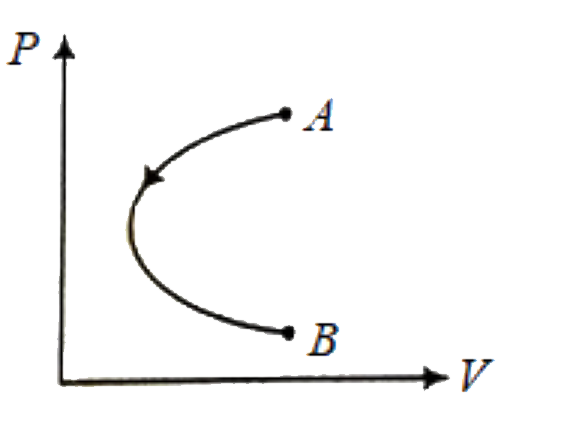For the expansion occuring from initial to final stage in finite time, which is incorrect?
Equilibrium exist in initial and final stage
Work obtained is maximum
Driving force is much greater than the opposing force
Both (1) & (2)
The correct Answer is:B
To solve the question regarding the incorrect statement about the expansion occurring from an initial to a final state in finite time, we will analyze each option step by step.
1. Understanding the Process:
- The question refers to an expansion process that occurs from an initial state to a final state in finite time. This suggests that we are dealing with a real (non-ideal) process, which is typically irreversible.
2. Option Analysis:
- Option A: "Equilibrium exists in initial and final state."
- In an irreversible process, the system does not pass through equilibrium states during the transition from initial to final states. Therefore, this statement is incorrect for an irreversible process.
- Option B: "Work obtained is maximum."
- In irreversible processes, the work done is not maximum; it is actually less than the maximum work that could be obtained in a reversible process. Thus, this statement is also incorrect.
- Option C: "Driving force is much greater than the opposing force."
- In irreversible processes, this statement is generally true. The driving force (the force pushing the system towards equilibrium) is indeed greater than the opposing forces (such as friction or resistance). Hence, this statement is correct.
- Option D: "Both A and B."
- Since both Option A and Option B are incorrect statements regarding the irreversible process, this option is also correct.
3. Conclusion:
- The incorrect statements regarding the expansion process are found in Options A and B. Therefore, the answer to the question is Option B, which states that "Work obtained is maximum."
Final Answer:
The incorrect option is B: "Work obtained is maximum."
- The question refers to an expansion process that occurs from an initial state to a final state in finite time. This suggests that we are dealing with a real (non-ideal) process, which is typically irreversible.
- Option A: "Equilibrium exists in initial and final state."
- In an irreversible process, the system does not pass through equilibrium states during the transition from initial to final states. Therefore, this statement is incorrect for an irreversible process.
- Option B: "Work obtained is maximum."
- In irreversible processes, the work done is not maximum; it is actually less than the maximum work that could be obtained in a reversible process. Thus, this statement is also incorrect.
- Option C: "Driving force is much greater than the opposing force."
- In irreversible processes, this statement is generally true. The driving force (the force pushing the system towards equilibrium) is indeed greater than the opposing forces (such as friction or resistance). Hence, this statement is correct.
- Option D: "Both A and B."
- Since both Option A and Option B are incorrect statements regarding the irreversible process, this option is also correct.
- The incorrect statements regarding the expansion process are found in Options A and B. Therefore, the answer to the question is Option B, which states that "Work obtained is maximum."
The incorrect option is B: "Work obtained is maximum."
Topper's Solved these Questions
- THERMODYNAMICSBOOK - AAKASH INSTITUTE ENGLISHCHAPTER - THERMODYNAMICSEXERCISE - ASSIGNMENT (Section - C) Previous Years Questions
60 Videos
- THERMODYNAMICSBOOK - AAKASH INSTITUTE ENGLISHCHAPTER - THERMODYNAMICSEXERCISE - ASSIGNMENT (Section -D) Assertion-Reason Type Questions
15 Videos
- THERMODYNAMICSBOOK - AAKASH INSTITUTE ENGLISHCHAPTER - THERMODYNAMICSEXERCISE - ASSIGNMENT (Section - A) Objective Type Questions
55 Videos
- THE SOLID STATE BOOK - AAKASH INSTITUTE ENGLISHCHAPTER - THE SOLID STATE EXERCISE - Assignment (SECTION - D) (ASSERTION-REASON TYPE QUESTION)
20 Videos
Similar Questions
In a certain electronic transition in Hydrogen atom from an initial state to a final state, the difference of orbit radius is 8 times the first Bohr radius. Which transition does satisfy the given condition?
View SolutionAn idel gas undrgoes isothermal process from some initial state i to final state f. Choose the correct alternatives.
View Solution
Knowledge Check
An ideal gas undergoes isothermal process from some initial state i to final state f. Choose the correct alternatives.
A1.dU=dQB2. dU=-dWC3. dU=0D4. dU=dW
An ideal gas undergoes adiabatic expansion against constant external pressure. Which of the following is incorrect.
View SolutionCan we use Boyle's law to calculate the volume of a real gas from its initial state to final state during adiabatic expansion?
View SolutionCan we use Boyle's law to calculate the volume of a real gas from its initial state to final state during adiabatic expansion?
View SolutionP - V diagram of an ideal gas is shown. The gas undergoes from initial state A to final state B such that initial and final volumes are same. Select the correct alternative for given process AB.

View SolutionIn a certain electronic transition in the Hydrogen atom from an initial state i to a final state the difference in the orbit radius (ri−rf) is seven times the first Bohr radius. Identify the transition
View SolutionWhich of the following reaction ends in finite time ?
View SolutionAn electron in a hydrogen atom makes a transition from n1→n2. If the time period of electron in the initial state is eight times that in the final state then Find the ratio n1n2
View Solution
